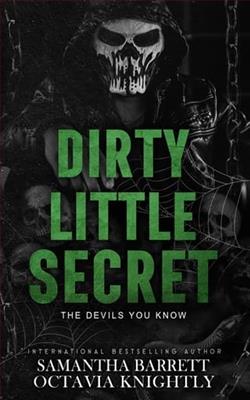Page 58 of The Cornish Princess
“I bend the knee to no man,” he said finally, and Gwendolyn lifted a brow.
“As you can hardly have failed to note, I am not a man.”
“Neither any woman,” he added.
“Not even to my father, the King?”
For a long, long while, he didn’t respond, and then when he did, all puckishness fled from his tone, and he said soberly, “My loyalty is to Pretania, though I care deeply about the King’s welfare.”
“And mine?”
“And yours.”
Some of Gwendolyn’s anger deflated—only a little. But there was a certain verity to his words… a truth as elusive and ancient as thefaerieglens. If indeed he were true-bloodfae, he would have been not only one of the original conservators of this land, but perhaps its maker as well. After all, it was thefae—whether one called themSidhe,fae, or elf—who were Cornwall’s true forebears. She wished she had the nerve to ask him directly, but alas, she did not. Instead, she fought a tug of war within herself, thinking him yes, thinking him no.
Being children of the gods, all these lands—from Ériu to Land’s End, to the farthest reaches of the Caledonian confederacy—were once created for those even-tempered creatures whose armament of choice wasmagik, not swords.
They had already vanished from Pretania long before Gwendolyn was born. All the stories she’d ever heard came from theAwenydds, and these were tales told by thedawnsio.
The Tuatha Dé Danann were said to have descended upon Ériu from a place calledTír na nÓg—the Land of the Ever Young—bornebyships that were carried upon a sea of blood clouds, ushering in a darkness that lasted three days and nights. From four sacred cities, they carried with them four great talismans, all graven with spells. The first was the Sword of Light, which was forged in Finias, and belonged to Núada Airgetlám, the Tuatha’an king, who’d named it Claímh Solais.
It was a fiery sword of glowing light that was said to render the bearer invincible when it was wielded, and could deflect weaves of power, depending on the requirement of its wielder—with the sole exception of balefire, which eventually killed Núada.
The second talisman was the Lúin of Celtchar, fashioned in Gorias, and known to some as Lugh’s spear. This was a long, flaming lance that must be kept with its head in a vat of blood to prevent it from igniting and consuming its wielder. Made from darkened bronze, and tapered into a sharp point, it was fastened to a rowan haft by thirty rivets of gold.
Then there was Dagda’s Cauldron from Murias.
This talisman was said to be kept to this very day in Ériu, and it was a blessing to its house, for none with a pure heart was ever sent away with an aching belly.
Last, there was Lia Fáil, hailing from Falias. This was the crying stone upon which the true kings of Ériu were crowned, and the stone no longer cried Danann.
Of the four talismans, three were said to remain in Ériu. One, the sword, was lost, never to be seen again. And yet, with talismans like those, it was no wonder Ériu had thrived so long beneath the Tuatha’an rule. In fact, it was said that, during this time, even mortals lived longer—a thousand years and more. Under the hand of thefae, the land prospered, nourished by sacred pools like the one that graced their glen. But as the tale would have it told, the Tuatha’an arrogance grew to such great proportions that the gods sent the sons of Míl to teach them a lesson in humility.
Before that Ending Battle was fought, it was agreed the victors would choose the spoils, and when the time came to choose dominions, the sons of Míl chose the half of Ériu that lay aboveground, forcing the Tuatha Dé Danann into the Underworld.
Manannán himself escorted them there via theSidhemounds, after which he raised an enchanted mist to conceal them from mortal eyes.
This was why the Tuatha Dé Danann were sometimes known asfaeorSidhe—faefor theFaeth Fiadhathat concealed them,Sidhefor the mountains that swallowed them whole.
Never intended to be polite, “elf” was the appellation given to them by the sons of Míl, who’d named them “white beings.”
The man riding at her back could easily pass for such a “white being,” with his silver hair andicebourneeyes. And yet his armament of choice was notmagik,but a sword.
Unwittingly, she reached up to pull a curl of her own hair between her fingertips, considering thefaewho’d descended upon her crib.
There had been two, an elder and a younger, called Esme. Her mother and Demelza had stood watching from the threshold as the two chittered over Gwendolyn’s crib. Demelza once told her both were extraordinary—skin translucent like stardust, with eyes that burned with the light of two suns. And upon smiling, both revealed sharp, savage teeth—and this, too, reminded her of Málik. If he opened his mouth and looked at her in a certain way, his entire look was transformed…Savage. Wild. Untamed.
For a moment, Gwendolyn embraced the silence, scarcely aware that she’d relaxed against his chest, until she felt his chin settle atop her pate. The feel of it softened the armor around her heart. No matter his attitude, he had willingly come to serve her father, and no matter if he did so with such egotism that it disgusted her to her core, there was no crime in that.
Furthermore, as annoying as he could be, he had without protest accepted a position as her Shadow, even despite that this was not the promise made to lure him to Trevena. This was not so prestigious an occupation as one might suppose. It was far more rewarding to be a Mester at Arms, or a mentor to the Elite Guard, but if one must serve as a Shadow, it was more prestigious to serve as a guard to the king himself. In serving Gwendolyn, he suffered all the bother and aggravation—long hours, often thankless, with few rewards to speak of—and truly none of the glory. It was for that reason Gwendolyn had treated Bryn so much like a brother, and she’d tried so desperately to make sure he took time for himself.
This was also why she’d coaxed him to the glen that day and now… Gwendolyn was ashamed to say that at the instant, she wasn’t missing him at all.
Poor Bryn.
Nor could she explain it, but she’d hardly thought about Prince Locrinus since his departure a few days ago, even with the heavy torc and chain about her neck—and really, it was so much heavier than hers, fashioned so that no one wearing it could forget it was there.
Indeed, with half the day gone in the saddle, and Trevena long in their wake, the Promise Ceremony seemed years away.















